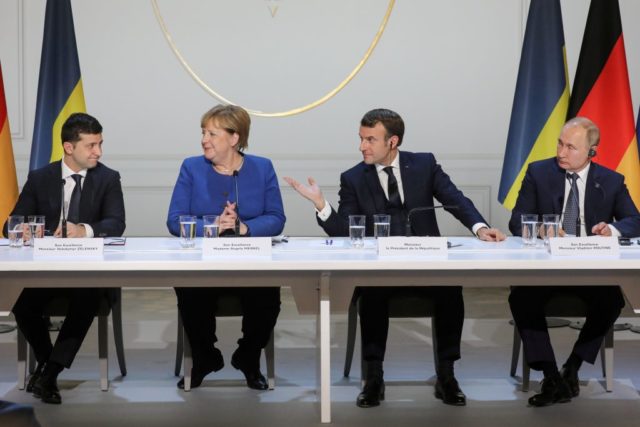
Ukraine Working out Revisions to the Minsk ‘Accords’ (Part Two)
Publication: Eurasia Daily Monitor Volume: 17 Issue: 8
By:

*To read Part One, please click here.
Russia uses a strict-constructionist approach to defend the Minsk “accords” of 2014 and 2015 and the negotiation formats (“Normandy Quartet” and the “Contact Group on Ukraine”) that it imposed on Ukraine five years ago under military duress. Kyiv, by contrast, is trying a revisionist approach to these same documents and forums. They never acquired any legal validity, but have been endorsed all along by Germany and France in the Normandy forum (bringing together the leadership of Ukraine, Russia, France and Germany), to which the Minsk Contact Group (Ukraine, Russia, the Organization for Security and Cooperation in Europe, and the Donetsk and Luhansk “people’s republics”) is subordinate. Revising the Minsk “agreements,” and reconfiguring the negotiating formats designed to implement those documents, would necessitate the consent of all parties involved.
The Kremlin takes the position that the Minsk “agreements” are “without alternative” and that Ukraine must “execute of all of the Minsk agreements’ stipulations to their full extent and in their sequence” (TASS, January 11, 17).
Ukraine’s best available legal protection at this stage remains the legislation enacted by the preceding parliament in January 2018 and signed by then-president Petro Poroshenko in February of that year (Ukrinform, January 18, 19, 2018 and February 20, 2018). Under that enactment, it would be unlawful for Ukraine to accept the special status and “elections” in Donetsk-Luhansk in the presence of “unlawful armed formations” and while Russian forces control the border there. Although the 2018 enactment is valid in terms of Ukrainian domestic law (not internationally), the Minsk “agreements” have no legal standing of any kind, nor would any implementing arrangements, unless President Volodymyr Zelenskyy and his Servant of the People party decide to give them the force of Ukrainian law.
The 2018 legislation amended Ukraine’s law on a special status for the Russian-controlled Donetsk-Luhansk, which had been adopted in 2014 and 2015 under Russian military coercion and German political pressure. The amendments passed in 2018 were designed to block the implementation of that special status on Russian terms, preserving, however, the possibility of a solution compatible with Ukraine’s sovereignty.
The Kremlin wants President Zelenskyy to replace Ukraine’s existing law on the special status (as amended in 2018) with a new law on the special status of Donetsk-Luhansk. The existing law never came into force, partly because Ukraine declined to introduce the notion of “special status” into the constitution (hence this inoperative law is unconstitutional), and partly because Moscow wants Kyiv to negotiate the special status legislation with Donetsk-Luhansk, instead of Kyiv determining that special status unilaterally. President Zelenskyy and the parliament have prolonged the validity of the existing law one last time in December 2019, a few days before its expiry, in order to avoid its extinction on December 31, and in understanding with Moscow that this old law would be replaced by a new one in 2020 (see EDM, January 16, 2020). The new law on the special status would incorporate the Steinmeier Formula, as per Zelenskyy’s promise to Moscow and the other Normandy participants at the recent summit. Moreover, Kyiv seems willing this time around to discuss the special status and the ensuing implementing legislation in the Minsk Contact Group with Donetsk and Luhansk. To mitigate these concessions, Kyiv seeks to change the composition of the Donetsk-Luhansk delegation in the Contact Group and hopes to avoid amending Ukraine’s constitution (see above).
The looming danger is that Zelenskyy’s team would eliminate the 2018 amendments from the old law in the process of drafting the new law on the special status. If so, Ukraine would lose the legal safeguards that could, if necessary, block an externally imposed political settlement injurious to Ukraine’s sovereignty.



